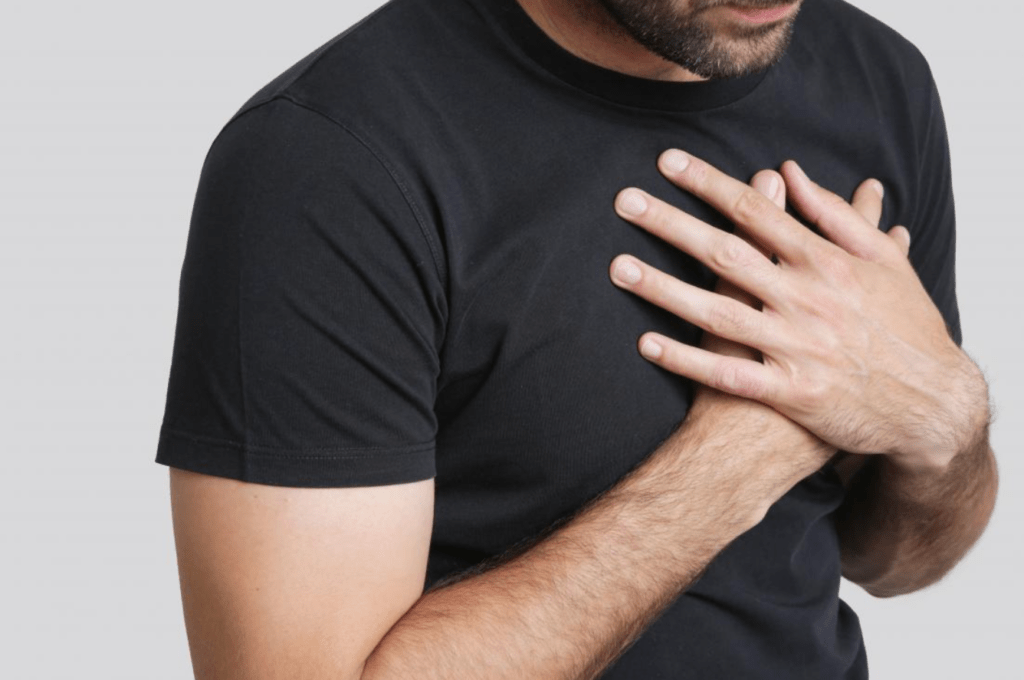Heartburn Caused by Coffee
After enjoying your morning coffee, are you experiencing heartburn? While coffee is loved by many as a pick-me-up, it occasionally causes intestinal discomfort for other people. We’ll explore the connection between coffee and heartburn in this blog and learn the causes of this common phenomenon.
We enjoy coffee in a variety of ways: If we prepare it ourselves or get it from a coffee shop or gas station it gives a morning and/or afternoon ritual, has an energizing effect, and appeals to people with a range of preferences whether you prefer it black, with cream or sugar, or with added flavors. Join us as we explore the mysteries around coffee-induced heartburn and find ways to enjoy your beloved cup without discomfort, from knowing the components of coffee to identifying effective treatments.
What is Heartburn?
First, a word about today’s antagonist. Stomach acids that should remain in the stomach go up toward the throat, causing heartburn. Your chest may start to feel tight and hot as a result. Everyone occasionally experiences heartburn, but some people are more likely to do so frequently. You probably have experience with acid reflux if you have a sensitive stomach or a condition like GERD or IBS, and you’re seeking strategies to reduce the symptoms.
Can Coffee Cause Heartburn?

Even caffeine by itself can cause heartburn. The esophageal sphincter, which often contributes to acid reflux, is loosened by it. Furthermore, it may increase the amount of acid your stomach releases, resulting in acid reflux into your esophagus.6 If you discover that caffeine-containing drinks like soda or tea also give you heartburn, it may not be the acid in the coffee that is to blame.
At what times of the day is coffee most likely to cause heartburn?
Although you could notice that coffee makes you have heartburn in the morning, this is mainly because you drink coffee more frequently in the morning than at other times of the day. However, if coffee is a regular trigger for you, it might create heartburn at any time of day.
After consuming coffee, avoid lying down right away because this increases the likelihood that food and liquids will enter your esophagus. After consuming coffee, avoid lying down for two to three hours.
The likelihood of experiencing heartburn may also rise if coffee is consumed on an empty stomach. To assist in settling your stomach, try to eat something before or after your morning or afternoon cup of coffee.
Explore Different Ways to Get Rid of Heartburn

Now we discussed different ways to deal with heartburn caused by coffee.
DRINK COFFEE WITH Low Acidity
Even people without a history of heartburn symptoms can experience stomach issues due to the acidity in coffee. Coffee is an acidic beverage by nature. Some people, especially those who are sensitive to acid in their foods and drinks, may experience discomfort and indigestion as a result. It’s what inspired the creator of Golden Ratio to enter the low-acid coffee industry.
Which kinds of coffee don’t give you the runs? Low-acid, gold roast coffee is a type of coffee that does not produce heartburn. Low-acid coffee may not only taste smoother and less harsh, but it may also be easier on the stomach. A low-acid coffee can help with IBS symptoms as well as heartburn problems because it is typically easier on your digestive tract.
REMOVE INFLAMMATION
Your coffee’s addition of cream and sugar could be the source of your heartburn. Some people have discovered that adding milk to their coffee reduces the symptoms of heartburn, while many feel it just makes things worse. High-fat milk and creamers are known to cause heartburn and are not good for anyone who is lactose intolerant to any degree.
Belly bloating and generalized body inflammation have been linked to sugars and artificial sweeteners. They are challenging to digest, which may make any heartburn symptoms you already have worse. Isolating those potential triggers ingredient by ingredient is the only way to identify the additives in your cup that are causing your heartburn.
Get a Safe Amount of Caffeine to Avoid Coffee Heartburn
Overconsumption of caffeine is a significant contributor to acid reflux. The muscle that links the stomach to the esophagus relaxes when your coffee intake is too high.1 When this occurs, a gap is made for stomach acid to enter your esophagus, resulting in acid reflux. Ew! That is quite offensive.
So how can we ensure that we consume a safe dose of caffeine? The majority of specialists concur that 600mg (4–7 cups) per day is excessive.2 For some people, including expectant moms, the recommended dosage is 200 mg or about 2 cups. Health Canada, the federal health agency in Canada, states that a daily caffeine intake of 400mg (a little over 4 cups) is considered to be safe.
Avoid Heartburn from Coffee by Just Consuming Shade-Grown Coffee
Did you realize there was a distinction between coffee grown in the shade and coffee grown in the sun? Since you don’t hear much about it, it’s not odd if you don’t. Because sun-grown coffee is less expensive to produce and of lower quality.
To cut expenses, sun-grown beans are commonly used in grocery store coffee blends. However, coffee shouldn’t grow in direct sunlight. It develops more quickly when exposed to the sun’s intense rays, making it much less expensive, but it also has higher acidity and bitterness. In addition to removing soil nutrients without replenishing them, clear-cutting forests and planting coffee in rows like corn cause soil erosion.
Reduce Your Caffeine Intake
If caffeine causes heartburn in you, cutting back on your usual caffeine intake may help greatly. The obvious and efficient alternative is decaf, but if you’re not a fan, don’t worry you might not need to give up caffeine entirely. For instance, switching to arabica beans may help you feel better because they have less caffeine than robusta beans.
Altering your brewing technique is another thing to attempt. You don’t have to wait till summer to enjoy cold brew coffee; you can prepare it at home any time of the year and it has less caffeine than hot brewed coffee.
Avoid Heartburn from Coffee by just Consuming 100% Arabica Coffee
You should think about only consuming coffee made from 100% Arabica beans in addition to coffee that is cultivated in shade. The two different varieties of coffee beans are Arabica and Robusta. (Again, given that there isn’t widespread advertising for it, it’s not odd that you might not be aware of this.) Because they grow at lower altitudes and are more hardy, Robusta beans are less expensive and more pest-resistant. However, Robusta beans have a higher bitterness and twice as much caffeine as Arabica beans.
Caffeine Monitoring
It’s always advisable to use caffeine in moderation. To prevent caffeine withdrawal if they decide to give up coffee in the future, even healthy individuals should limit their caffeine intake. The U.S. Food and Drug Administration (FDA) states that the daily limit for healthy adults is 400 mg, or the equivalent of around 4 cups of coffee.
The amount of caffeine in coffee also fluctuates depending on the roast level. A little goes a long way because a light roast has more caffeine than a dark roast. Furthermore, consuming too much caffeine might worsen anxiety and interfere with sleep. Caffeinated coffee is a healthy food option when consumed in moderation.
Add a Splash of Milk
For a variety of reasons, we at Peak State prefer our coffee unsweetened. However, if you suffer from GERD or heartburn, you might want to give a splash of milk a try. Milk contains calcium, which also helps to balance acidity. However, in addition to coffee’s inherent acidity, some milk proteins, such as casein, can bind to the CGAs in coffee and reduce its likelihood of raising stomach acid. which in turn may aid in reducing acid reflux. But not everyone will find milk and cream to be the best options, so in this case, trust your instincts.
Explore Other Triggers
Other than caffeine, the following factors are frequently linked to heartburn symptoms:
- Alcohol
- dishes with a lot of heat (such as those with black pepper, garlic, and chili powder)
- onion raw
- Chocolate
- Peppermint/spearmint
- tangerine fruits
- Oily foods
- Fried food
- Caffeinated drinks
- fabricated snacks
- tomatoes (which are used in ketchup, salsas, and sauces)
- evening snacks
- Medications on prescription
- sour foods
There may be something on the list that doesn’t interfere with your quality of life because triggers differ from person to person. You might not be aware of all your triggers for heartburn symptoms until you eat them. Finding each trigger individually and then making dietary modifications, as a result, may be necessary for symptom management.
Wrapping Up!
In conclusion, controlling heartburn brought on by coffee requires comprehension of the complex interaction between acidity and personal tolerance levels. Coffee is adored for its robust flavor and energizing properties but for some people it can cause heartburn. But this doesn’t imply that you should stop drinking your preferred beverage entirely.
It is possible to continue drinking coffee without experiencing any discomfort by making thoughtful decisions like selecting low-acid coffee kinds altering brewing techniques, or investigating alternatives like cold brew. Heartburn can also be reduced by paying attention to portion amounts and taking into account variables like meal timing.

